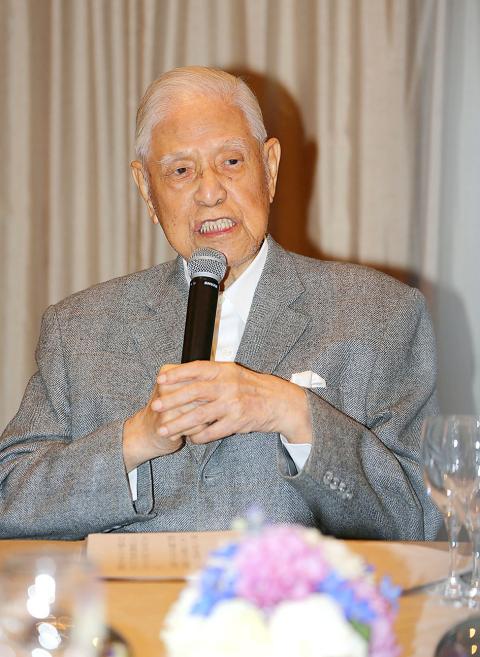China’s worst enemy is that it does not genuinely embrace democracy and freedom, and Taiwan, which does, will not be its enemy, former president Lee Teng-hui (李登輝) said on Sunday in Japan.
Lee made the remarks at a dinner gathering with Taiwanese expatriates in Okinawa, in which he said that Taiwan would someday present itself on world stage with its own name.
In the 21st century, China has become an assertive player on the economic, political, military and technological fronts, but it is seen as a hegemony, not a civilized country upholding the ideas of democracy and freedom, Lee said.

Photo: CNA
China has become the “most destabilizing factor” in Asia and has caused disturbances that threaten the security of countries in the region, he said.
Its ambitious Belt and Road Initiative — a scheme focused on investing large sums of money in infrastructure development in targeted countries — will turn many of the countries into “economic colonies of China,” he said.
An overbearing China is felt most keenly by Taiwan because China has more than 1,000 missiles targeted at Taiwan, frequently flown an array of military aircraft around Taiwan, lured away its diplomatic allies and obstructed its international participation, he said.
Economically, China has continued to steal technologies from Taiwan, offered lucrative packages to poach Taiwan’s human resources, and pressed Taiwanese businesspeople in China to give up their political beliefs in favor of China’s, Lee added.
China has also tried to build up its networks of operatives in Taiwan by offering money or using seduction to lure or disturb Taiwanese society, he said.
On one hand, China has coined the term “Chinese dream” to promote the idea of a “Greater China,” while on the other, it has employed the so-called “1992 consensus” to uphold its “one China” principle to suppress the development of Taiwan, Lee said.
Beijing’s use of a variety of tactics, including verbal intimidation, military threats, economic coercion, social division and bribery are aimed at annexing Taiwan to realize its dream of unification, he said.
“We are not afraid of China’s deliberate efforts to degrade Taiwan. Deep down in our hearts, we cannot degrade ourselves,” Lee said.
Some people, who are trapped by the idea of a “Greater China,” have become lost, not knowing where to go or what to do, Lee said, adding that they have succumbed to Chinese hegemony and are bought off by China for short-term interests.
Lee criticized the Chinese regime of running counter to the universal human value of democracy and freedom, projecting itself as a country of great power and prosperity.
He accused China of using the “Chinese dream” to fool Chinese citizens in order to maintain the Chinese Communist Party’s grip on power, Lee said.
“Taiwan is not your enemy, not now and not in the future. Your greatest enemy is true democracy and true freedom,” the former president said.
The Chinese government should think about building permanent democracy and freedom, and seeking eternal happiness for all Chinese people, he said.
If China wants to become a world power, it could not achieve this by exporting hegemony; instead, it should strive to be a civilization that exports universal values, Lee said.

Japanese footwear brand Onitsuka Tiger today issued a public apology and said it has suspended an employee amid allegations that the staff member discriminated against a Vietnamese customer at its Taipei 101 store. Posting on the social media platform Threads yesterday, a user said that an employee at the store said that “those shoes are very expensive” when her friend, who is a migrant worker from Vietnam, asked for assistance. The employee then ignored her until she asked again, to which she replied: "We don't have a size 37." The post had amassed nearly 26,000 likes and 916 comments as of this

US President Donald Trump said "it’s up to" Chinese President Xi Jinping (習近平) what China does on Taiwan, but that he would be "very unhappy" with a change in the "status quo," the New York Times said in an interview published yesterday. Xi "considers it to be a part of China, and that’s up to him what he’s going to be doing," Trump told the newspaper on Wednesday. "But I’ve expressed to him that I would be very unhappy if he did that, and I don’t think he’ll do that," he added. "I hope he doesn’t do that." Trump made the comments in

Tourism in Kenting fell to a historic low for the second consecutive year last year, impacting hotels and other local businesses that rely on a steady stream of domestic tourists, the latest data showed. A total of 2.139 million tourists visited Kenting last year, down slightly from 2.14 million in 2024, the data showed. The number of tourists who visited the national park on the Hengchun Peninsula peaked in 2015 at 8.37 million people. That number has been below 2.2 million for two years, although there was a spike in October last year due to multiple long weekends. The occupancy rate for hotels

A cold surge advisory was today issued for 18 cities and counties across Taiwan, with temperatures of below 10°C forecast during the day and into tonight, the Central Weather Administration (CWA) said. New Taipei City, Taipei, Taoyuan and Hsinchu, Miaoli and Yilan counties are expected to experience sustained temperatures of 10°C or lower, the CWA said. Temperatures are likely to temporarily drop below 10°C in most other areas, except Taitung, Pingtung, Penghu and Lienchiang (Matsu) counties, CWA data showed. The cold weather is being caused by a strong continental cold air mass, combined with radiative cooling, a process in which heat escapes from